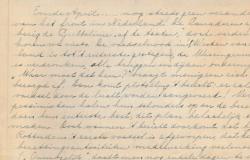25 apr 2024 om 10:02 Update: 12 min. geleden
Things are not going well in the Veluwe. The nature reserve suffers from nitrogen and there is too little water. The problems must be solved by finding solutions for the entire Veluwe, and no longer just for small parts.
Dehydration, acidification and an excess of nitrogen are the main causes of the Veluwe doing poorly, the Ecological Authority (EA) concluded on Thursday.
The EA assesses the condition of all protected nature reserves in the Netherlands and determines whether sufficient measures are being taken to improve nature.
Things are also going badly on the Veluwe due to pesticides, fragmentation and animals that eat the area bare.
Things are going very badly for, among other things, the beech-oak forests with holly. They are strongly acidified by the high levels of nitrogen, sometimes even two to three times more than what plants can handle.
The nitrogen is supplied from the air and through the groundwater. Because the large amount of nitrogen comes from outside the area, measures must be taken there.
It has been known for some time that the Veluwe suffers from too much nitrogen. More and more heath butterflies are disappearing and young tits are breaking their legs because they are not consuming enough calcium.
Job van der Plicht is binnenlandverslaggever
Job schrijft veel over de natuur, boeren en de stikstofcrisis. Ook maakte hij de podcast Verscheurd door de wolf over de terugkeer van de wolf in Nederland. Lees hier meer verhalen van Job.
Measures can also have negative consequences
In places where measures are already being taken, the consequences for other parts of the Netherlands’ largest nature reserve are not always carefully considered. What is a good measure for one area may have a negative effect on another part of the Veluwe.
Consider, for example, a dried-up stream through which water will flow again as a result of measures. If that results in another stream drying up, then that means mopping with the tap open. That is why the Ecological Authority advises to look at the Veluwe as a whole when taking measures.
‘Look at how water motor works’
Because the Veluwe also suffers from desiccation, the EA advises to look carefully at how water enters and leaves the area. The Veluwe collects a lot of water, but the water also flows away via streams, groundwater and the lower edges of the area.
“Understanding how this water engine works and how to conserve and distribute the water in the area is essential,” says Hans Mommaas, chairman of the Ecological Authority. “The drought increases acidification, which is already worryingly high.”
Based on more than seventy recommendations from the Ecological Authority, NU.nl previously concluded that the situation in Dutch nature has deteriorated dramatically. This is often due to nitrogen, but also due to dehydration, poor water quality and too much recreation.
Ecologische Autoriteit adviseert provincies over maatregelen
- De provincies hebben zogeheten natuurdoelanalyses gemaakt. Daarin staat welke bijzondere planten en dieren moeten worden behouden en welke maatregelen nodig zijn om dat voor elkaar te krijgen. Per gebied kunnen de doelen verschillen.
- De Ecologische Autoriteit (EA) is een onafhankelijke partij die de analyses beoordeelt. Ze geeft ook advies over wat beter kan.
- In de EA zitten mensen met veel kennis van de natuur, zoals wetenschappers en natuurbeheerders.
- De provincies zijn niet verplicht om de adviezen van de EA over te nemen.
Tags: major concerns state Veluwe largescale approach Domestic






